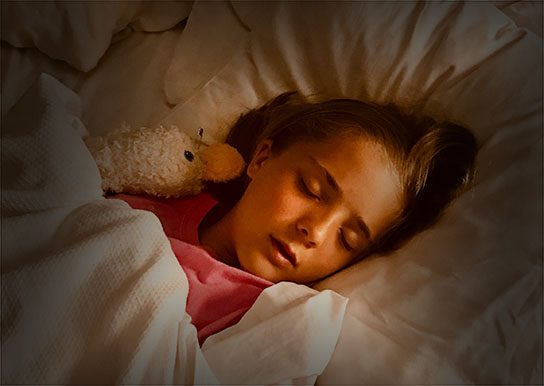Melatonin
The sleep and well-being hormone
The sleep and well-being hormone

Melatonin controls the day-night rhythm of the body. It belongs to the neurotransmitters and is produced almost exclusively at night via a complex circuit between the pineal gland and hypothalamus.
The receptors to which melatonin can dock and pass on its information are found in the hypothalamus, in the thermoregulatory cells of the brainstem, in cerebral blood vessels, and in some cells of the immune system.
Thirty years ago, knowledge about melatonin was still in its infancy.
Today, we know much more about it.


With increasing age, the body produces less melatonin. While the concentration in children is up to twelve times higher at night than during the day, the concentration in older people is often only three times higher at night than during the day. The widespread opinion that older people need less sleep is thus strongly questioned.
The performance of our brain is also closely related to melatonin levels. Concentration problems and forgetfulness can result from a too low melatonin level at night. These complaints can be observed in young people, especially if they regularly sit in front of a PC for a very long time and are thus exposed to a light source with a high blue component.
If a few simple points are taken into account so as not to impair the body's own melatonin production, restful sleep is the result.
Avoid light sources with a high blue component at least one hour before sleeping. This means not using a smartphone, tablet, PC or television. If you can't or don't want to do without them, then use a blue filter if possible. Studies indicate that light from electronic devices with a high blue content can disrupt melatonin production.
This is also true for children and teens, even though their melatonin levels are higher than adults.
Always try to go to bed around the same time. Our bodies have the ability to align with behavioral rhythms to a certain extent. Your internal clock sets the pace and the body follows. Always eating at the same time facilitates digestion. Always going to bed at the same time supports regeneration during sleep and the release of melatonin.
During the day, they should spend as much time as possible outside. Let yourself be spoiled by the entire spectrum of sunlight. Nothing gives a more pleasant warmth, nothing gives you more energy than the sun and in addition it inhibits the melatonin synthesis.
Sunlight gives the pineal gland an important and necessary break in the production of the "sleep hormone".

Cart is empty.